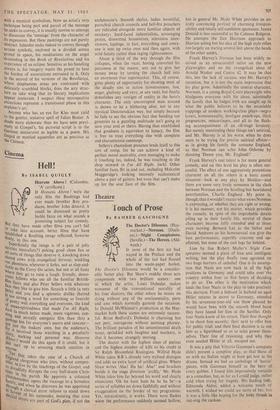Theatre
Touch of Prose
By BAMBER GASCOIGNE
The Doctor's Dilemma. (Hay- market.)—Norman. (Duch- ess.)----Night Conspirators. (Saville.)—The Heroes. (Ald- wych.)
IF most of the first act had stayed in the Preface and the whole of the last had floated into the waste-paper basket, The Doctor's Dilemma would be a consider- ably better play. But Shaw's middle three acts compensate with two brilliant scenes : one in which the artist, Louis Dubedat, makes nonsense of the conventional morality of his four doctors; the other where he insists on dying without any of the sentimentality, piety and awe which normally garnish the occasion. In Donald McWhinnie's production at the Hay- market both these scenes are extremely success- ful. Brian Bedford's Dubedat is charming but not pert, outrageous without seeming phoney. The brilliant paradox of his unsentimental death scene, sprinkled with laughter and mockery, is that it becomes strangely moving.
The doctor with the highest class of patient and the highest number of kills to his credit is Sir Ralph Bloomfield Bonington. Wilfrid Hyde White takes B.B.'s already very stylised dialogue and adds an extra layer of artificial gloss. Where Shaw writes `Ahal Ha ha! Ahal' and brackets beside it the stage direction 'archly,' Mr. Hyde White takes him far beyond his word and clearly enunciates 'Oh ho hum hum ha he ha he'—a series of syllables set down faithfully and without exaggeration on the border of my programme. Yet, miraculously, it works. There were flashes when the performance suddenly seemed hollow,
but in general Mr. Hyde White provides an en- tirely convincing portrait' of charming irrespon- sibility and totally_ self-confident ignorance. James Donald is less successful as Sir Colenso Ridgeon. He attempts the Flex Harrison approach to Shavian acting but his idea of the high style relies too largely on staring several feet above the heads of the other actors.
Frank Harvey's Norman has been widely re- ceived as an unsuccessful satire on the new playwrights and on the evangelical ideas of Arnold Wesker and Centre 42. It may be that this, less the lack of success, was Mr. Harvey's intention; but it is not the main impression that his play gives. Admittedly the central character, Norman, is a young Royal Court playwright who bludgeons everyone with his ideas; admittedly the family that he lodges with are caught up in what the public believes to be the invariable trappings of modern working-class plays—negro lovers, homosexuality, hooligan punch-ups, illicit pregnancies, miscarriages, and all to the flush- ing accompaniment of an off-stage lavatory. , But merely mentioning these things isn't satirical, and Mr. Harvey is at his worst when he does seem to be trying for precise satirical effects— as in giving his family the surname England, so that Norman can echo John Osborne by shouting 'Damn you, Mr. England!'
Frank Harvey's real talent is for more general comedy, and on this level his play is often suc- cessful. The effect of one aggressively pretentious character on all the others is a basic comic situation—look at any play by Moliere—and there are some very lively moments in the clash between Norman and the bristling but bewildered paterfamilias, Charlie England. My point is, though, that it wouldn't matter what views Norman is expressing, or whether they are right or wrong; it is his manner, not his matter, which provides the comedy. In spite of the improbable details piling up in their family life. several of these characters become fully rounded and at times even moving. Bernard Lee as the father and David Andrews as his homosexual son give the best performances, superbly concrete and un- affected, but none of the cast lags far behind.
Line by line Robert Muller's Night Con- spirators seemed a piece of lean and intelligent writing, but the play finally runs aground on two huge barriers of unbelief. One is its assump- tion that Nazis are now back in all the high positions in Germany and could take over the country within four or five hours of deciding to do so. The other is the motivation which leads the four Nazis in the play to take precisely this decision. From a hideout in Iceland an aged Hitler returns in secret to Germany, attended by his seventeen-year-old son (how pleased he would have been with the smooth blond beast they have found for him at the Saville). Only four Nazis know of his return. Their first thought is to shoot him secretly; their next to offer him for public trial; and their final decision is to use him as a figurehead so as to seize power them- selves. Their line of reasoning, and why they even needed Hitler at all, escaped me.
It was a pity that Vittorio Gassman's company didn't present a complete play, so that those of us with no Italian might at least get lost in the drama. Instead we had an anthology of 'heroic' pieces, with Gassman himself as the hero of every gobbet. I found him impressively versatile as a comedian, but, as far as I could judge, rather cold when trying for tragedy. His leading lady, Edmonda Aldini, added a welcome touch of warmth. I wished we could see more of her, but it was a little like hoping for the baby thrush to out-sing the cuckoo.


































 Previous page
Previous page